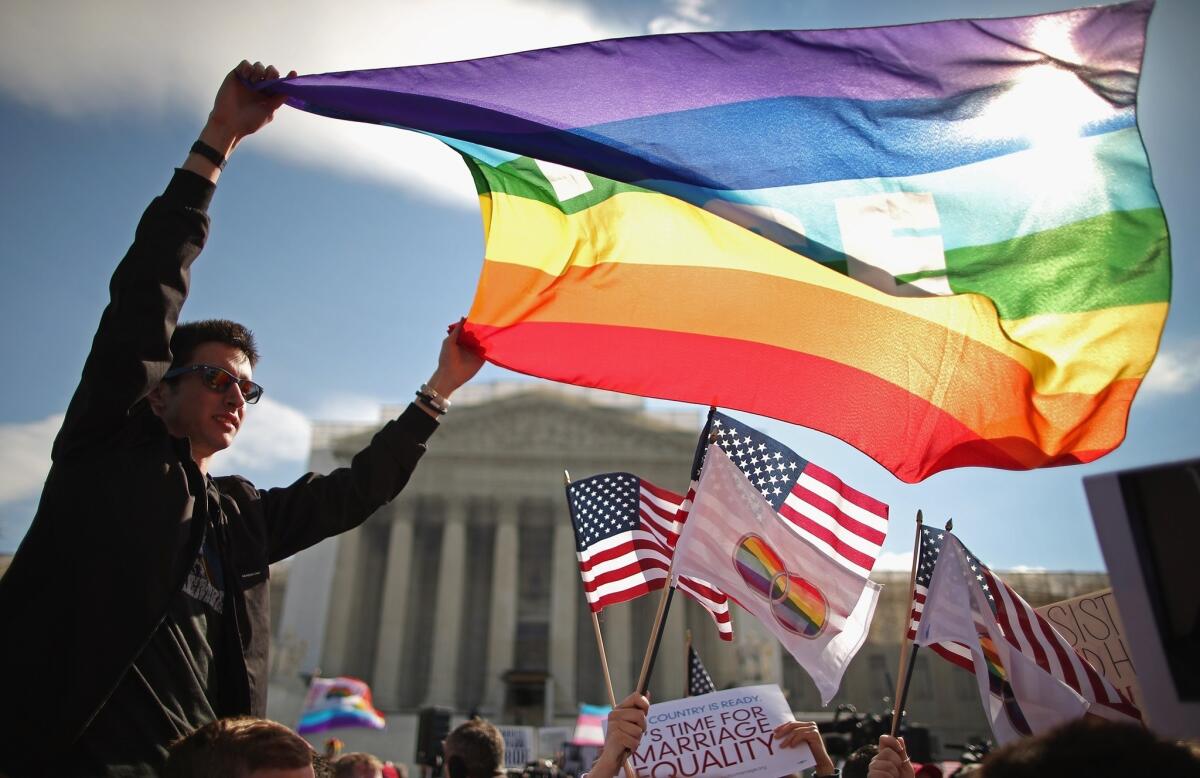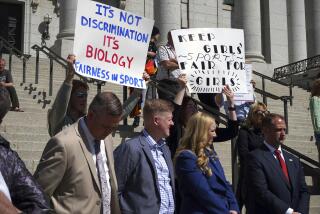Gay marriage coming to the South? Kentucky ruling chips away at ban

Same-sex marriage may soon be coming to the South.
A federal judge struck down part of Kentucky’s same-sex marriage ban on Wednesday, joining a string of similar rulings in conservative states that have put the future of the country’s remaining bans in doubt.
District Judge John G. Heyburn ordered that Kentucky recognize same-sex marriages that had been legally performed in other states and opened the door wide for activists to strike down Kentucky’s ban entirely.
No federal judge has ruled in favor of such bans since a landmark U.S. Supreme Court decision on the issue last summer. Recent judicial decisions have overturned or chipped away at state laws banning gay marriage that once passed with the great popular support of voters and state legislatures.
It wasn’t immediately clear how Heyburn’s ruling will be received in deeply conservative Kentucky, whose voters approved a constitutional ban on same-sex marriage in 2004 with 74% of the vote.
A spokeswoman for Atty. Gen. Jack Conway told the Los Angeles Times that his office was still reviewing Heyburn’s decision.
The judge, an appointee of President George H.W. Bush, perhaps aware of the outrage his ruling might raise, connected his arguments against the state’s ban with allusions to the country’s past civil rights struggles against sexism and racism.
Protecting tradition, Heyburn wrote, no matter how ancient or deeply held, was not good enough of defense for laws that create different rules for different groups of people.
“For years, many states had a tradition of segregation and even articulated reasons why it created a better, more stable society,” Heyburn wrote, in what may likely become one of the most frequently-quoted passages of his decision. “Similarly, many states deprived women of their equal rights under the law, believing this to properly preserve our traditions.
“In time, even the most strident supporters of these views understood that they could not enforce their particular moral views to the detriment of another’s constitutional rights. Here as well, sometime in the not too distant future, the same understanding will come to pass.”
Kentucky joins Utah and Oklahoma in a small avalanche of similar findings by state and federal judges across the country who have followed a legal path tenuously laid out by a U.S. Supreme Court ruling last summer.
Several judges, including Heyburn, have signaled some uncertainty in exactly how to decipher the logic of the high court’s decision, which threw out part of the federal Defense of Marriage Act but didn’t say whether state bans were outright constitutional.
But how those judges have ruled have made one thing clear: The Supreme Court’s ruling gave a significant amount of legal ammunition for gay and lesbian couples to challenge those bans in even the country’s most conservative states.
The Kentucky decision will likely draw some attention in neighboring Missouri, where the American Civil Liberties Union filed a similar lawsuit in state court Wednesday requesting that Missouri recognize legal same-sex marriages performed in other states.
In the lawsuit that prompted Wednesday’s decision in Kentucky, longtime couples had asked not for the right to marry in Kentucky, but to have their marriages elsewhere recognized by state officials, partially for the sake of getting legal benefits.
Heyburn ruled accordingly and hinted that Kentucky’s remaining restrictions on the practice may be doomed if someone files a lawsuit requesting the right to marry inside state borders: There was “no doubt” that the Supreme Court’s ruling on the Defense of Marriage Act “suggest a possible answer to that question,” Heyburn noted.
What about a definitive answer? That may be coming soon too, as many legal analysts expect that the nation’s highest court may be asked to weigh in more decisively about whether states can constitutionally prevent same-sex couples from marrying each other.
In a portion of his decision directed toward Kentuckians who might be upset at his ruling, Heyburn wrote that the legal arguments supporting same-sex marriage have been building for decades, and that “sometime in the next few years at least one other Supreme Court opinion will likely complete this judicial journey.”
More to Read
Sign up for Essential California
The most important California stories and recommendations in your inbox every morning.
You may occasionally receive promotional content from the Los Angeles Times.











